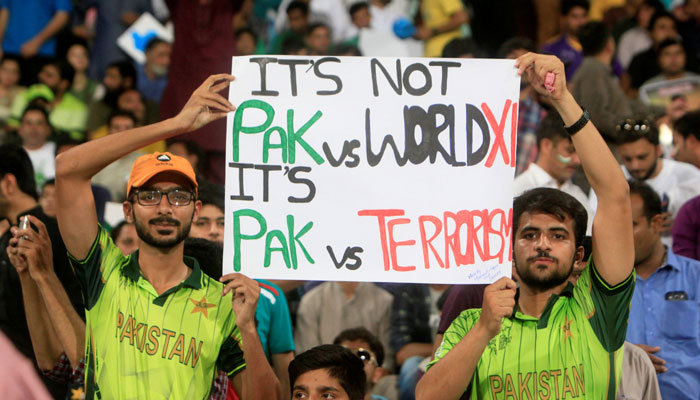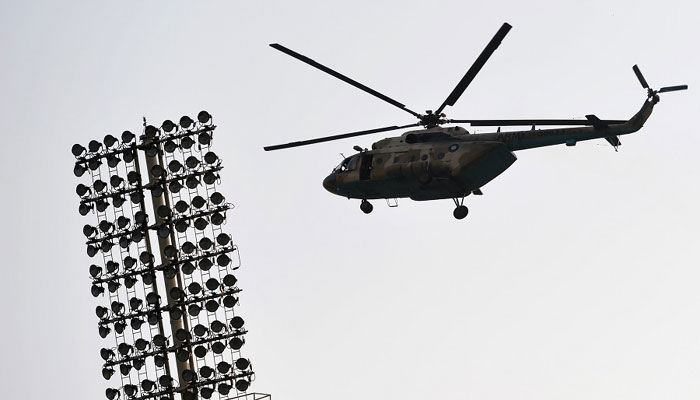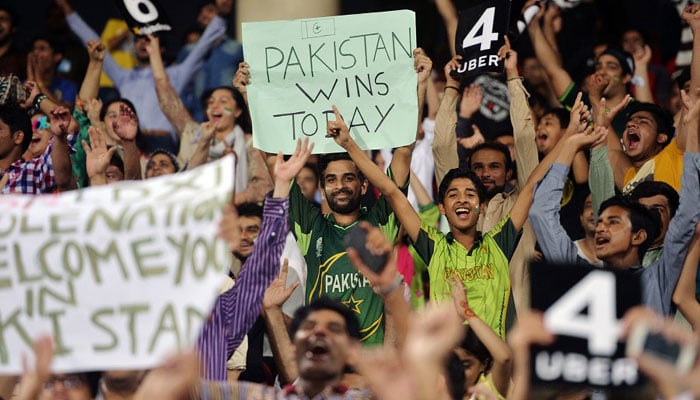At the end of the long battle, cricket won
Cricket fans had waited loyally for almost a decade to see a player raise his bat and salute them
September 26, 2017

On the morning of May 8, 2002, the New Zealand cricket team assembled in the lobby of the Pearl Continental Hotel in Karachi, preparing to take on Pakistan at the National Stadium on the first day of the second Test. Outside, in the circular drive, a bus carrying French engineers was getting ready to leave for the Naval Dockyards. Unnoticed by anyone, a car sneaked in, drove right up to the bus, and blew up. The impact of the bomb ripped through the bus, shattering glass in the lobby, tearing apart the windows of the rooms upstairs. Eleven engineers on board the bus died, along with two Pakistanis. A less bemoaned casualty was the New Zealand team’s tour. A shaken Stephen Fleming, the captain of the team, told reporters that the blast left him shattered. Team manager Jeff Crowe read out a statement in a press briefing, which said that while he felt sorry for Pakistan and its cricket board, it was time to go home. The tour was called off, and the first blow to international cricket in Pakistan hit bull’s eye.
Many cricketing nations hesitated about playing in Pakistan after this incident, but were somehow convinced to visit, and so our grounds were not empty. At least not then. New Zealand itself came back in 2003 and West Indies had a memorable tour here in 2006-2007. And then came the fateful events of March 2009 when the Sri Lankan cricket team was attacked by terrorists in the early hours of the morning, just as their bus was a few hundred feet away from the stadium. The alert driver managed to save all the passengers on board his bus with an extraordinary display of bravery. The tour was called off and with it the doors to hosting international cricket were closed to Pakistan.
For a nation that loved the game as much as Pakistanis did, this was a blow of staggering proportions. Home series were to be played in the neutral grounds of the UAE from there on, with spectators here forced to watch on their screens, any dream of cheering their team in person under the brilliant floodlights of their home grounds squashed, seemingly forever.

Equally demoralized was the Pakistan cricket team itself, used to displaying histrionics in front of roaring home crowds. Yet they trudged on, shrugging off the setback. As fate would have it, far away from their fans, the team blossomed into a cohesive side, formidable opponents displaying the same prowess as did the fabled team of the 90s. The green shirts managed to win the T20 World Cup, and under Misbah ul Haq’s capable leadership, many a Test series, each notable for the determination the team showed in beating the odds.
Yet, at home, the odds of international cricket returning were slim to none. In this scenario, Najam Sethi took over the Pakistan Cricket Board and decided that the old dream, the Pakistan Super League, will be a reality. The first season of the PSL was successful, despite the bets being stacked against Pakistan. PSL marked a turning point, one that affected not just international cricket but domestic too. Many talented players emerged on the national scene. This new blood injected new life into the team, which was evident when Pakistan managed to win the Champions Trophy, comprehensively defeating archrivals India to lift the cup.
One last challenge remained, that of bringing international cricket back to Pakistan’s empty grounds. Zimbabwe did tour Pakistan for three matches in 2015, but that could not be termed the return of cricket, despite packed grounds. After all, Zimbabwe was good, but the superstars of the game were not there. More remained to be done, and finally, in 2017, the World XI came here to play three T20s. Full of the biggest names the game had to offer, the star-studded team came to Lahore. It doesn’t get any bigger than Faf du Plessis, Hashim Amla, Darren Sammy, Grant Elliott and Imran Tahir. When the week was over, Pakistan had won the series by 2-1. Ecstatic Pakistanis supported the touring team as much as they supported their own players. Every boundary, every wicket, regardless of whom it came against, was met with thunderous applause. Just a stone’s throw away, at the site of the attack on Sri Lanka, the ground reverberated with cheers carrying through from the Gaddafi Stadium.
With every round of ovation, the clouds of doom that lingered over the Liberty roundabout, lifted a bit, until finally they were dispersed altogether.

One unwanted consequence of the matches was the lockdown Lahore had to go through. Public routes had to be closed or traffic had to be re-routed through other roads. Citizens were stuck for hours in traffic jams the likes of which the city had never seen before. While it is true that law enforcement agencies left no stone unturned to protect the visiting team, it is also unfortunately true that ambulances were stalled, workers reached their offices late and left early, students were either given the entire week off or were let go early. Businesses on the adjoining roads were either forced to shut down for the week or had practically no business as most people stayed home to avoid the traffic. Over 6,000 policemen were stationed at various points in the city. If Sri Lanka is to visit in October, and West Indies is to play here in November, then is Lahore to go through the same kind of lockdown? A workable solution would be to make sure that other cities are also given a chance to host the games, thus reducing the burden off of Lahore.
Lastly, while we are grateful to the World XI for coming here to us, we must be equally thankful to the police, the military and the Rangers who made this event a success. Day and night, in the crippling heat, they carried out their duties with the utmost responsibility. In the end, the green shirts may have won the series, but victory was not theirs alone. It belonged to the security personnel outside, it belonged to the PCB, it belonged to the ICC, it belonged to each player in the World XI, and finally, it belonged to the game itself and its fans here, who had waited loyally for almost a decade to see a player raise his bat and salute them.
The writer is a researcher at Geo TV and can be contacted at [email protected]











